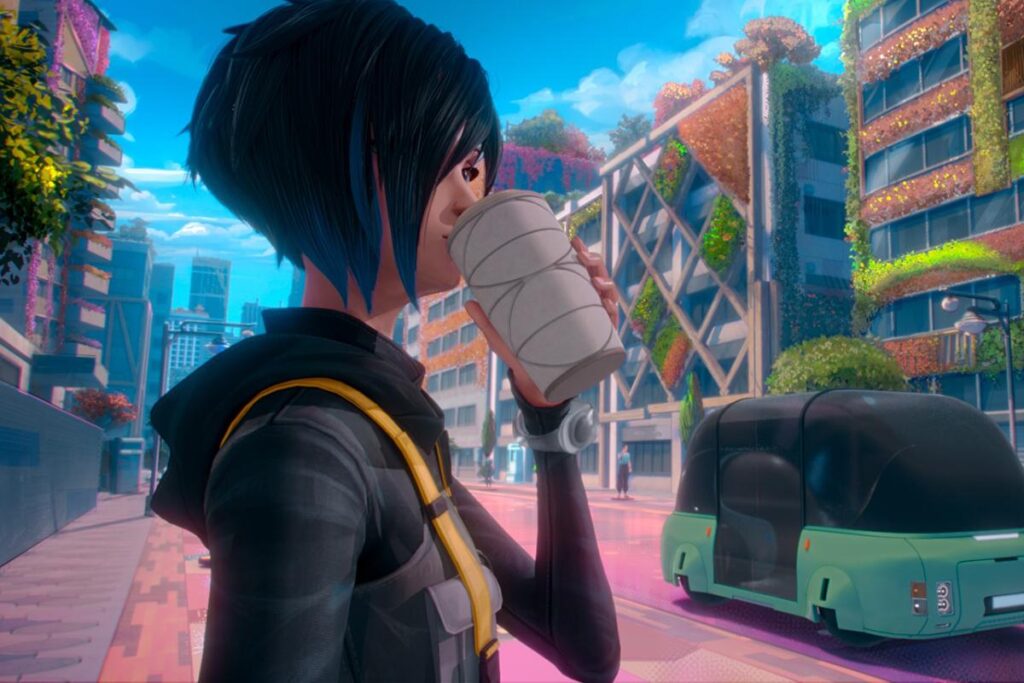New action-adventure anime series Tokyo Override (now on Netflix) is set in the titular city 100 years in the future, where AI seems to dictate the lives of the citizenry, who’ve given up piles and piles of personal freedom in exchange for piping-hot bowls of ramen delivered right to your apartment window by cheerful drones. I mean, who needs boring ol’ autonomy anyway? But some aren’t compelled to live by the rules of digital-fascist oppression, namely, a squad of Robin Hood types who pose as delivery people but are actually rebellious types tearing through Tokyo on motorcycles based on the real-life designs of bikes that Netflix would really like us to namedrop right about… here. But I’m not gonna do it. I’m too inspired by the spirit of the rebellious characters in this show to comply, which is a way of saying it’s a pretty good watch so far.
Opening Shot: An overhead shot of Tokyo that’s essentially a digital grid and a collection of data points.
The Gist: This Tokyo is the type of society that tells you real loud and with an untrustworthy smile that it’s a perfect utopia when it’s actually a dystopia. It’s divided into three sections, West, East and Mid Tokyo, divided by “digital walls.” Everything is “optimized” for maximum efficiency – an automated, with cars that drive themselves and pedestrians floating through the city on hoverdiscs. Those hoverdiscs track your every move and the people in charge are almost certainly major a-holes who’ve created a “post-scarcity, post-privacy society.” There’s always a tradeoff, I guess.
Now, if you were a teenage loner living in this visually beautiful, philosophically hideous place, you might be like Kai (Fairouz Ai): sulking, letting your bangs hang in your face, skipping school to hone your hacking skills and generally just being way too emo than your doctor would ever recommend. You’ll spend 25 or so minutes with her in this first episode, and she’ll never crack a smile. The ramen looks amazing though. She lives alone in an apartment and is probably an orphan, but I can’t say so for sure. She’s gotta be A Story, one that the show will likely get to after this debut episode establishes the setting, quickly introduces us to the protagonist and blows our heads off with high-velocity head-exploding motorcycle-chase action.
But as you might expect, the zoom-zoom comes later, after Kai strays out of the West, where she lives, to Mid, which seems to be the seamier part of town. She’s there to acquire a drug called “highway” for her only friend, who’s kinda annoying and chirpy, but someone has to counteract Kai’s black-cloud moping. The drug deal goes south when government narcs bust her and pin her down, but Kai fights back, using her wristwatch to fry their iPads, blinding them just long enough so she can escape.
This is when she runs into the badasses from Suma Garage, the aforementioned not-delivery-but-actually-motorcycle-people: Hugo (Ryota Takeuchi), Spoke (Tomoaki Maeno), Watari (Mariya Ise) and Yukio (Shigeru Chiba). Read into things a little, and they strike you as post-emo-mopers who found their confidence when they learned to do supercool action-hero shit, and that might by why they let Kai tag along after the only non-corrupt government official in Tokyo, Ieuji (Yuhko Kaida), asks them to deliver a small haul of undocumented children from point A to point B for reasons that escaped me, because the uber-dynamic high-velocity booster-rocket motorcycle chase that ensues fried some brain cells. Gotta say, it’s pretty cool.
What Shows Will It Remind You Of? I know they’re films and not TV series, but Tokyo Override is an anime mashup of The Matrix (or The Animatrix if you want a deeper reference) and The Fast and the Furious.
Our Take: Tokyo Override builds a visually and conceptually intricate world, and the debut episode shoves you into it headfirst without a flotation device. That isn’t necessarily a criticism. Considerable effort went into the writing and design, and it’s all up there on the screen for you to be a bit overwhelmed by. It takes a few for you to acclimate to the busy visuals, which collide with exposition delivered via Kai’s woe-is-me voiceover that goes on and on about how this world is a collection of data points, etc., and explains how the government surveils people and all that. You might hit the rewind button a few times.
But once the narrative settles down and gets to the task at hand – namely, delivering a rollicking chase sequence – it really takes off. Kai meets the Planet Expre- er, Suma Garage crew, they hop on their crotch rockets, and the series is off and running with a dynamic tearass through Tokyo, our vigilante heroes being pursued by deadly AI-futuro versions of the sentient tire from Rubber. It’s fun, and the animation is slick and vibrant, not too terribly far removed from the top-shelf video-gamey eye candy of Arcane, but surely far less expensive.
A peek at teasers for the remaining five episodes finds the series pointing toward Kai’s further integration into the Suma squad (rebel factions in dystopian societies can never have enough hackers, y’know), a deeper look into the workings of the ruling Digital Ministry (I have a hunch they’re all a bunch of jerks, and possibly inhuman AI jerks) and a conspiracy plot involving Ieuji. Maybe our heroes will make this world a better place? Gotta keep watching to find out, and despite some familiar story beats, doing so doesn’t seem at all unpleasant.
Sex and Skin: None so far.
Parting Shot: A closeup of one of the narcs as he holds up a clue: the Highway drug that Kai fetched.
Sleeper Star: Watari seems like the character who has her head on straight around here. Time will tell, though. These are short episodes and character development is sketchy early on.
Most Pilot-y Line: Kai gets all reductionist and philosophical and summarize-y about the arc of the series: “Some points collide catastrophically, and some connect in serendipity. This is the story of a non-optimal cluster of points trying to survive in an optimized network.”
Our Call: Tokyo Override’s storytelling wavers between keeping you on your toes-slash-challenging you to pay attention (passive viewing, it ain’t), and overwhelming you with too much information. But the richly dynamic animation compensates for it. Fans of sci-fi and anime will likely find it agreeable. STREAM IT.
John Serba is a freelance writer and film critic based in Grand Rapids, Michigan.
Read the full article here








